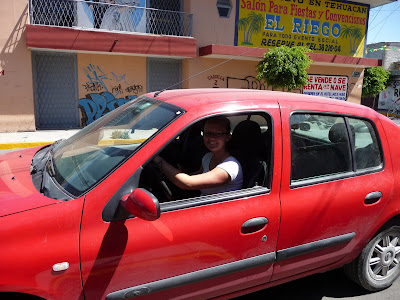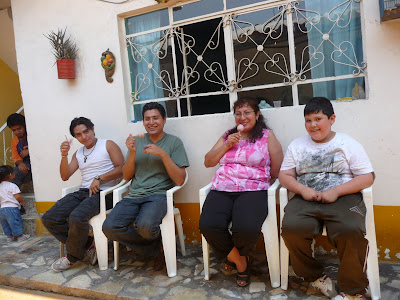One evening, we were walking to the car post LUCHADORS!!! If Nacho Libre just popped into your head, you are so right. I'll have to tell you about that lovely experience later. Anyway, we were walking to the car and Miguel says to me:
Quieres a tu mama?
So I quickly translate that in my brain to mean:
Do you want your mom?
As in, am I homesick, or something like that.
So of course I'm like:
No.
He makes a confused face, and decides "No entiendes." So he asks again:
Quieres a tu mama?
I retranslate, but guess what. I get the same thing:
Do you want your mom?
So I look kind of confused and reply:
Uhh, noo?
He puts on a shocked face and says:
NO QUIERES A TU MAMA?!?!?!?!?!?
And then he puts on his English brain and pulls out:
L-Love?
Ohhhhh. I get this sudden flash back to some random day in ninth grade Spanish with Miss Erickson telling us there are like seven thousand kinds of love and one of them is the verb querer, which usually means to want, but in this instance, it refers to love. It's the kind of love you have for casual friends, and just things you like a lot, like spaghetti for example. And it obviously applies to your madre as well.
So then I'm like:
Oh si si quiero a mi mama.
And then he fake punches me in the face and I flinch and he tells me I don't love my mom and starts laughing his face off. It's a game. You have to hold strong and not flinch in order to prove you love your mom or something.
Anyway, point is, do you see what I have to deal with every single day? The communication barrier in this place is ridiculous! High school spanish did not prepare me for this. There are so many times I misinterpret things, or they misinterpret me, or we get culturally confused at each other, and it is just crazy. But really, that's the fun of it all. I love how the communication goes around here.
Did you watch the pogo sticking videos? Miguel doesn't speak English, but guess what. I always speak English to him. He speaks Spanish to me and I reply in English, and he carries on in Spanish and we seriously have conversations like that every single day and I love it! There is also a lot of acting involved and that adds an element of its own.
When I first got here, every time Jorge would burp I would say, "Excuse you." Then one time he burped and I didn't say anything so he said, "Excuse you,"and smiled this big smile like he was so smart. It was hilarious. So I showed him the difference between me and you and taught him to say, "Excuse me" when he burps and he's been saying it ever since. It's been like a month now, so I think it's stuck. Which is awesome. It's funny because he thinks it means, "I'm sorry." But he doesn't speak enough/any English so I can't explain the difference, so I just let him carry on with his English phrases that he doesn't fully understand.
Speaking of commonly heard phrases that are not fully understood, here are some I hear ALL THE TIME (and don't judge if I spell them wrong):
1. Orale. It's an expression. I think it's kind of like holy cow or something.
2. Dejalo. That's used when someone is doing something you don't want them to like fighting, or hitting, or trying to snatch something, etc.
3. Ya. Like I've already told you, ya is used for everything, and it means something to the effect of enough. Eloisa always says to me, "Ya comiste (fill in the blank with the name of some food or something)" or "Ya tomaste cereal?" And when we are going to leave they say, "Ya nos vamos." Or just "Ya." Remember the day we went to the pool and played on that spinny thing? Well, I was spinning it as fast as possible and then everyone started getting sick so they were all saying, "Ya." So I stopped and they were satisfied. Also at the pool, me, Elvira, Roberto, Daniel, and the aunt whose name I know not were trying to sit on this floaty tube thing and I got on, but I was kind of confused at what I was supposed to be doing, so I was like, "Ya? Ya?" As in, "Is this right?" But they thought I meant I was done with them balancing it, so they let go and I flipped over. I try not to use that word anymore.
4. Did you notice the "tomasta cereal" part in the previous item? That is confusing in and of itself because tomar is to drink, which refers to liquid, and apparently cereal. So you can drink cereal here. I don't get it.
5. No manches! I hear that about seven thousand times a day and people use it in the context of, "I can't believe it!"
6. Teacher, can I pass? Yes, this one is in English, because that's what people say to me when I'm teaching and they want to come in and get something. Apparently in Spanish, when you want to enter a room, you don't say, "Can I come in?" You say, "Puedo pasar?" So when you translate it directly, it comes out, "Can I pass?" Thus it's a new English phrase I will probably use for the rest of my life because I think it's funny.
7. Si, no? This is probably my favorite. In English we say something and then we add "right?" or "ya?" at the end. For example, "These are mine, right?" Well in Spanish you say, "Estos son mios, no?" So when you are doing something and you want to know if you are right, you say, "Si, no?" It cracks me up every time.
8. Verdad? Possibly more common than the question no? is the question verdad? They really put that at the end of EVERYTHING and I love love love it, verdad?
That's all I can think of right now, but I'm sure there are plenty more to come as I remember them.
Even though I still suck at speaking Spanish (because I never practice, I basically always speak English) I am getting much better at understanding, especially the things I hear a lot, and I don't even have to translate those anymore. One time I was walking toward the stairs when I heard Elvira shout from behind me, "Correle, Brittan! Correle!" And I automatically started running. I didn't even have to think. It was awesome.
Also, one time I was reading my scriptures and I seriously read Jesus as Jesús. You know, like how you would read it in Spanish. And one time I was saying a prayer and I accidentally said Gracias instead of Thank you. Best prayer ever.
Anyway, there is a lot more I could tell you about the life I am living with this language, but I'll just finish with this one last story.
Today I didn't have to teach because it's vacation, so I went with Elvira and Eloisa to pick up los niños a la escuela. So me, Elvira, and Jorge were standing there against a wall waiting for Eloisa to find Miguel, and I was speaking English left and right as I always do. Then this little girl comes up to me with a huge smile on her face and says, "Hello!" And I say, "Hi!" And then she walks away feeling super awesome. Approximately four minutes later she comes back up to me again with the same huge smile and says, "Hi!" So I say (slowly, of course), "Hi! How are you?" She turns to her friend and says, "Que dijo?" Her friend just shrugs, because he didn't understand me either. So she turns back to me and says (in a robotic way, and with much thought), "My name is..."
It was hilarious.
Entonces, there you have it. A day in the life of communicating conmigo, aqui in Mexico.























































